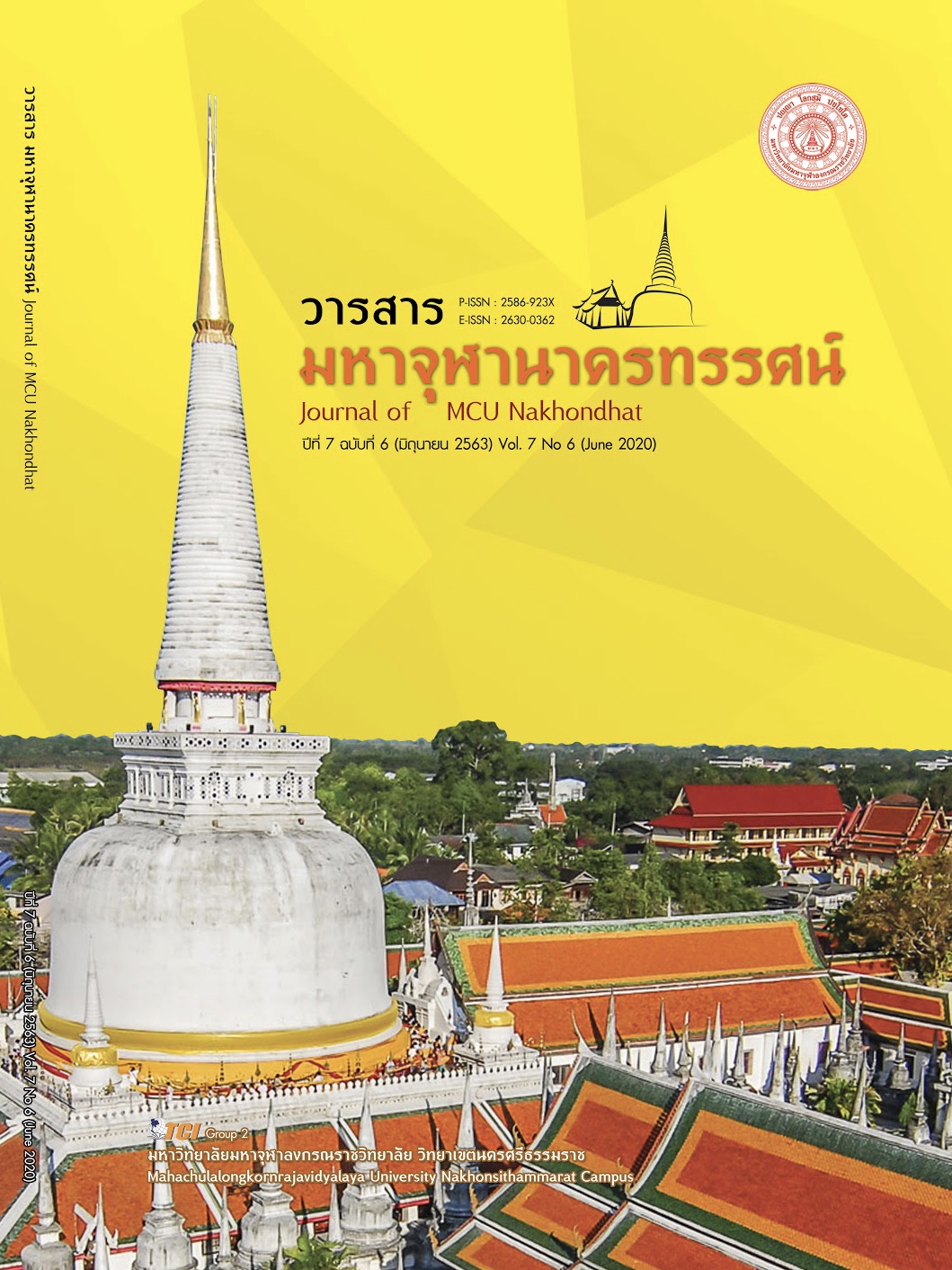THE RELATIONSHIP BETWEEN THE ADMINISTRATORS’ EXERCISE OF POWER AND WORK HAPPINESS OF THE TEACHERS IN THE SCHOOLS UNDER THE NAKONRATCHASIMA PRIMARY EDUCATIONAL AREA OFFICE 2
Main Article Content
Abstract
The purposes of this research were to 1) examine the exercise of power of the administrators in the schools under Nakonratchasima Primary Educational Service Area Office 2 2) investigate the work happiness of the teachers in the schools under Nakonratchasima Primary Educational Service Area Office 2 and 3) examine the relationship between the administrators’ exercise of power and the work happiness of the teachers in the schools under Nakonratchasima Primary Educational Service Area Office 2. The study sample were comprised of 162 teachers in the schools under Nakonratchasima Primary Educational Service Area Office 2. The instrument used for collecting the data was a 5 – point rating scale questionnaire with the reliability of .95. The statistics used for analyzing the collected data were percentage, mean, standard deviation and Pearson’s Product Moment Correlation Coefficient.
The research findings were as follows: 1) the school administrators’ exercise of power was practiced at high level in whole and in part. The listed mean scores in order from the highest to the lowest included referent power, expert power, reward power, coercive power and legitimate power 2) the school teachers’ work happiness was at high level in whole and in part. The listed mean scores in order from the highest to the lowest included job achievement, recognition, work of love and interpersonal connection and 3) the school administrators’ exercise of power positively correlated with the teachers’ work happiness at low level at the .01 level of significance. After item analysis, the relationship between coercive power and reward power was at low level. Furthermore, legitimate power, expert power and referent power correlated with the school administrators’ exercise of power at low level.
Article Details
References
ชาญวิทย์ วสันต์ธนารัตน์. (2551). องค์กรแห่งความสุขด้วยความสุข 8 ประการ. หมอชาวบ้าน, 30 (349), 18-25.
ชานน ตรงดี. (2551). ความสัมพันธ์ระหว่างการใช้อำนาจของผู้บริหารกับแรงจูงใจในการทำงานของครูโรงเรียนมัธยมศึกษา สังกัดสำนักงานเขตพื้นที่หนองคาย. ใน วิทยานิพนธ์ครุศาสตรมหาบัณฑิต สาขาวิชาการบริหารการศึกษา. มหาวิทยาลัยราชภัฏอุดรธานี.
บังอร มูลทรัพย์. (2556). ความคิดเห็นของครูผู้สอนที่มีต่อการใช้อำนาจของผู้บริหารสถานศึกษาศูนย์เครือข่ายทุ่งใหญ่ สังกัดสำนักงานเขตพื้นที่การศึกษาประถมศึกษาร้อยเอ็ด เขต 2. ใน สารนิพนธ์การศึกษามหาบัณฑิต สาขาวิชาการบริหารการศึกษา. มหาวิทยาลัยมหามกุฏราชวิทยาลัย.
พวงรัตน์ ทวีรัตน์. (2540). วิธีการวิจัยทางพฤติกรรมศาสตร์และสังคมศาสตร์. (พิมพ์ครั้งที่ 7). กรุงเทพมหานคร: มหาวิทยาลัยศรีนครินทรวิโรฒ ประสานมิตร.
สำนักงานเขตพื้นที่การศึกษาประถมศึกษานครราชสีมา เขต 2. (2561). รายงานการพัฒนาคุณภาพการศึกษาปีงบประมาณ 2561. นครราชสีมา: สำนักงานเขตพื้นที่การศึกษาประถมศึกษานครราชสีมา เขต 2.
Cronbach, L. J. (1990). Essentials of psychological testing. (3rd ed.). NY: Harper & Collins.
Krejcie, R. V. & Morgan, D. W. (1970). Determining Sample Size for Research Activities. Journal Education and Psychology Measurement, 3(30), 607-610.
Likert, R. (1967). The Method of Constructing and Attitude Scale. In Reading in Fishbeic. M (Ed.), Attitude Theory and Measurement. New York: Wiley & Son.
Manion, J. (2003). Joy at work: Creating a positive work place. Journal of Nursing Administration, 33(12), 652-655.
Ringrose, C. K. (1997). An enploratory study of relationship between the teacher perception of the bases of power used by selected elementary principals, the management systems of the principals. Dissertation Abstracts International, 38(2), 59-A.


